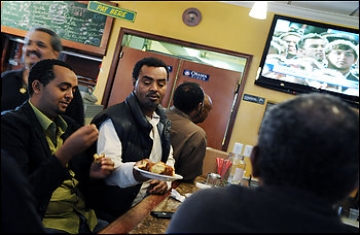
Above: Seyoum Shikuto shares a pastry with Yonas Eyassu,
left, at Dama Pastry & Cafe in Arlington, a hub for Ethiopians,
the day after the election. (Photos By Jahi Chikwendiu)
By Pamela Constable
Washington Post Staff Writer
Thursday, November 13, 2008; Page VA19
Ethiopian immigrants, who make up the largest contingent of African emigres in the Washington area, often gather after work at cafes such as Dukem’s in the District or Dama’s in Arlington to watch televised soccer, listen to lilting songs in their native Amharic language and rehash arguments about the ongoing political turmoil in their native Horn of Africa.
But ever since the night of Nov. 4, when Barack Obama clinched the presidency, the laid-back establishments have been buzzing with excitement, pride and purpose. Cabbies finishing their shifts greet each other with hugs and high-fives. Barflies are glued to televised replays of Obama’s victory speech. In the buzz of Amharic chatter, every other words seems to be “Obama.”
“He’s a descendant of Africa, like we are, so this means a great deal to all of us. But it’s not only because he’s black. It’s because of his message and his example,” said Donato Spinaci, an Ethiopian restaurant owner in the District who hosted several fundraisers for Obama’s campaign. “This election will open the door for all Americans, from every country, to become whatever they want.”
At Hailu Dama’s cafe and bakery on Columbia Pike, a social hub for Arlington County’s Ethiopian American community, last week’s election-night partying lasted until dawn, and the ebullient mood has continued.
“This has electrified our community like nothing I have ever seen,” said Dama, who came to the United States from Addis Ababa, Ethiopia, 30 years ago and is one of Arlington’s best-known immigrant entrepreneurs. “For the past eight years, America’s beacon of hope has grown dimmer and dimmer, but suddenly it seems brighter. We can’t stop celebrating.”
As sons and daughters of Africa, Ethiopian immigrants said, they had a special reason to savor the victory of Obama, whose father was Kenyan. More than 20,000 Ethiopian emigres live in the Washington area, along with thousands of their U.S.-born children. Many are longtime refugees who have become U.S. citizens. Immigrants from neighboring Eritrea and Somalia are also numerous and increasingly engaged in local politics.
In the summer, Spinaci and other African-born restaurant owners hosted fundraising events for Obama, contributing thousands to his campaign. A local group was formed, Ethiopians for Obama, which led campaign caravans to neighboring states and posted a promotional video on YouTube in Amharic.
“Many of us came to this country seeking freedom from dictatorship. We love democracy, but we never dreamed we would see an African American win the presidency,” said Binyam Yinesu, 49, a regular at Dama’s cafe who co-manages a gourmet shop in Alexandria. “Now, maybe America will have a foreign policy that does not help dictatorships in countries like mine.”
Ethiopia has been embroiled in decades of violent conflict, often involving Somalia and Eritrea, that has resulted in several million deaths and prompted hundreds of thousands to leave their country. In the past, U.S. administrations related to the region largely through the prism of anti-communism, propping up ruthless allied regimes, critics say.
Recently, Islamic radicalism has added a new element to the volatile mix. A brutal Islamic militia, forced from power in Addis Ababa, is terrorizing civilians. Dama, a Christian who fled Ethiopia’s wars in 1974, said many of his relatives and friends back home filled churches the night before the election, praying for Obama’s victory.
In addition to hopes that Obama would bring relief to their troubled homeland, cafe patrons said, his campaign theme of inclusiveness had touched them as immigrants and members of a racial minority who have staked their futures here.
“We don’t expect change to come overnight, but we will all get more respect now as African Americans. Obama will not only be an American president, he will be a world president,” said Getachelu Zewdie, the manager at Dukem’s restaurant on U Street NW, which was filled with Ethiopian songs, chants and dancing on election night.
“We’re ecstatic,” said Acham Mulugeta, 35, an education consultant. “His message has wiped out the idea that you can’t succeed if you’re black. This is not about color or policy or where you were born. It is about reaching across lines and working hard and getting things done. It is about unity. Yes we can, and yes I can,” she said.
As Mulugeta spoke, a knot of men around the coffee bar stared intently at TV replays of Obama’s victory speech and listened with rapt appreciation as Rep. John Lewis (D-Ga..) emotionally recounted his experiences in the civil rights movement, when police clubbed and dragged off unarmed demonstrators in the South.
“When I went to vote on Tuesday, it felt like when people in South Africa were voting for the first time for Nelson Mandela,” said Yonas Eyassu, 34, a U.N. employee from Eritrea who was sitting at the bar. “This is history. It is a great message of change, not just because I come from Africa, but for everyone.”

























